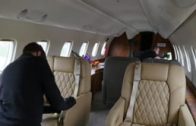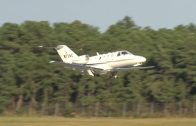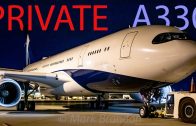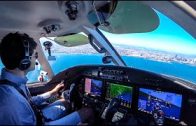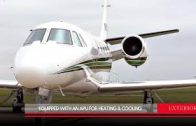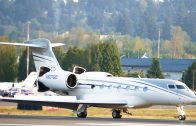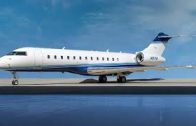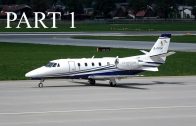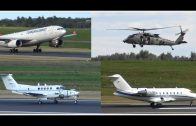It’s not clear how well private jet travel will hold up as the COVID-19 Coronavirus crisis reaches around the globe.
Early hubris about big spikes in call volume and new customers using private jets to relocate elderly parents are turning to a more measured view of the market. Several insiders say private flights in the U.S. were down by around 40% last week with worldwide flying off by more than 30%. London City Airport, popular with private jet travelers, is shutting down for all flights beginning tonight. Increasing restrictions on who can travel where are making international flights more difficult.
Last week, six groups representing private aviation wrote to congressional leaders outlining the industry’s need for government assistance.
“The business aviation industry is resilient and has a proven track record of providing humanitarian assistance during times of need,” according to the letter. “However, the air carriers within our industry are facing unprecedented challenges, and we appreciate your consideration of our requests. We look forward to being engaged in discussions on a potential relief package for all air carriers and thank you for your leadership.”Recommended For You
- This National Park Should Be On Your Wander List Right Now
- Travel Alert: Covid-19 Cases Are Back To July Levels, And Rising Fast
- Tourist Returns ‘Cursed’ Stolen Artifacts To Pompeii After 15 Years Bad Luck
While many users of private aviation are UHNWs, the plea highlighted the industry is made up primarily of small and midsize companies, some that may not have access to financial markets during the crisis.
PROMOTEDOracle BRANDVOICE | Paid ProgramCOVID-19 Has Made Quarterly Cloud App Innovation More Important: 4 ExamplesServiceNow BRANDVOICE | Paid ProgramHow To Light Up Your OrganizationTableau BRANDVOICE | Paid ProgramEnvironmental Leadership Will Be More In Demand Than Ever After Covid-19
“With the majority of business aviation air carriers being private companies, their access to capital is more constrained. In the current environment, private equity markets are not able to provide financing, eliminating an important source of liquidity for the industry,” according to the letter.
The industry accounts for over 1.2 million jobs in the U.S. alone.
An analysis by Tuvoli, a B2B platform for charter brokers and operators, shows while there are 573 operators in the U.S. with at least one business jet available for charter, 71% have five or fewer jets in their fleet.

Before cuts in scheduled flights by the airlines, private aviation already provided lifeline links to more than 5,000 airports in the U.S., compared to under 500 by scheduled carriers.
While the common image of private aviation users is well-heeled CEOs, celebrities and other super rich, private flights are also used to bring critical materials to customers and hard-to-reach plants and facilities. Private aviation is also on the front lines with first responders in times of crisis, and air ambulances are part of the larger business aviation sector.
A survey last week of subscribers by Private Jet Card Comparisons, a website I own and where I serve as editor, showed although 36% of respondents had taken extra flights because of the crisis, 39% had canceled trips.
A third (33%) expect private flights this year to increase compared to last year, 34% now forecast a drop, with the remainder saying they expect their private travels to be flat.
The results represent a decline from the outlook prior to the pandemic. Before the crisis, only 6% said they expected private flight hours to drop this year, with 45% expecting them to increase. Those surveyed averaged 111 private flight hours in 2019.
So far, at least two membership providers have launched short-term options in response to the virus.
Jet Linx, which normally sells its jet card memberships on an annual basis, is offering 90-day jet cards. The cost to join is $5,000 compared to the normal $17,500 and offers guaranteed availability at fixed-hourly rates with 48 hours notice.
Jet cards that offer pre-set pricing enable customers to avoid surge prices during high-demand periods, for example, when everyone wants to leave New York City. Many jet cards don’t charge for ferry fees, the expense of positioning the aircraft to pick you or up or return to base after you are dropped off.
This morning, VistaJet, a unit of Vista Global Holdings, joined the fray. Its guaranteed programs normally require a three-year commitment. It’s now offering short-term leases between one and three months. You get a dedicated aircraft and flight crew based at an airport near you. The packages includes 50 hours of travel per month, and you can add hours at a reduced rate.
Customers who want a guaranteed solution for the short-term can choose between several aircraft options, including the 14-seat, 7-bed Bombardier Global 6000, with a range of up to 13 hours flying. Also available is the Challenger 350, a popular super midsize private jet that seats eight that can fly coast-to-coast nonstop.
Aside from product, private jet operators have been both highlighting extra safety procedures and the benefits of private flights. An analysis by Austria-based GlobeAir, which operates four passenger Citation Mustangs in Europe, found risk of exposure is 30 times lower on private flights compared to the airlines. That said, increased government restrictions on who can fly where meant it has now cut its service area to just the United Kingdom, France, Switzerland, Austria, Germany, The Netherlands, Spain, Belgium, and Luxembourg from all of Europe.
Flexjet, part of the Directional Aviation group of companies, announced its flight crews would eschew commercial airlines to reduce potential exposure to the virus. Private pilots often use the airlines to position themselves for their next trip and return home afterwards. Private flight crews typically work in stints ranging from six to 17 days.
Additionally, the fractional share operator had MicroShield 360, an EPA-registered, FDA-approved antimicrobial coating system that kills 99.99% of bacteria applied to its fleet. Treated surfaces constantly reduce germs on surfaces 24/7, the company said.
Constant Aviation, another Directional company, which applies the treatment, said so far it has done so to more than 250 private aircraft. It expects the number of aircraft treated double by the end of the month. Application crews are now present at more than 150 airports nationwide, and technicians have streamlined the process to less than two hours even on large-cabin aircraft.
In addition to the promotional jet cards, Jet Linx said it using BIOPROTECTUs System to disinfect and protect its fleet of 112 jet aircraft, private base terminals, and facilities throughout the United States.
VistaJet earlier this month reported was already taking extra precautions to ensure its crews remain virus free. NetJets, a unit of Berkshire Hathaway, the world’s largest operator of private jets, announced enhanced cleaning and crew procedures as well. It’s also suspended flights to China, South Korea, or Italy.
With companies that need to move employees finding it harder to do with airline cutbacks, JSX, which operates scheduled flights in the Western U.S. using private jet terminals, has been promoting its 30-seat Embraer 135/145s for corporate shuttles.
JSX and its sister JetSuite, just this week helped with the repatriation of 106 U.S. citizens. Most were over the age of 65, and it was all done on less than 48 hours’ notice.
An executive with JetSuite said the company is finalizing a 10-hour jet card in response to demand from first time customers who want a short-term solution.
Air Partner, a U.K.-based private aviation company which sells private jet charters and jet cards, launched Air Partner Protect. The service offers quick response evacuation, as well as vetting charter operators to ensure aircraft have been deep cleaned and crew are following strict hygiene precautions.
Private Jet Services Group, which specializes in sports team charters, live entertainment tours, and IP) road shows, has returned 11,500 people safely to their homes, assisting students, athletes, government officials, corporate executives, and families all on a worldwide basis.
“We are grateful for our employees, vendors, airport and FBO teams, fuelers and the countless aircraft cleaners who made it possible to swiftly execute these missions,” said Greg Raif, its founder and CEO.
The European Business Aviation Association has launched a COVID-19 Resource Center that includes updated travel restrictions, as well as business restrictions on a country-by-country basis.
IADA, which stands for International Aircraft Dealers Association, noted in the first half of this month a spike in used aircraft transactions. It said members completed 54 transactions during March through the 20th. Additionally, there are over 120 aircraft, under contract, subject to closing.
How long the good times will stay remains hazy. “Clearly, there is a strong push to make deals in advance of the challenging uncertainties that are ahead of us all,” said IADA Executive Director Wayne Starling. He believes despite the seemingly positive news, transactions are “very likely to slow as approvals and regulatory obligations take longer to achieve.”
